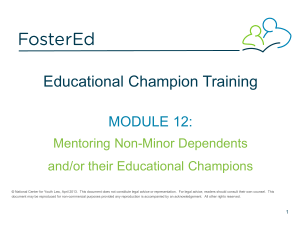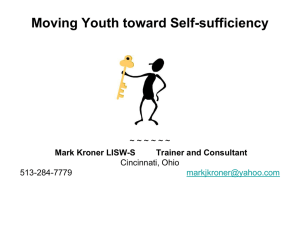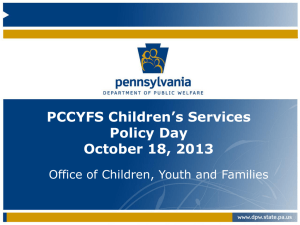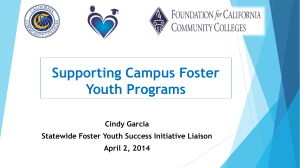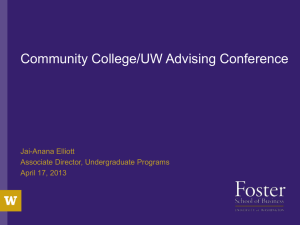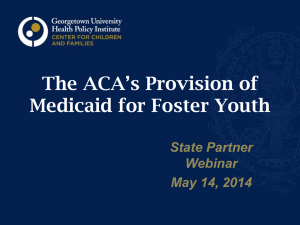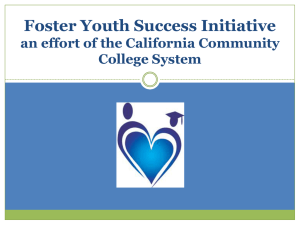presentation
advertisement
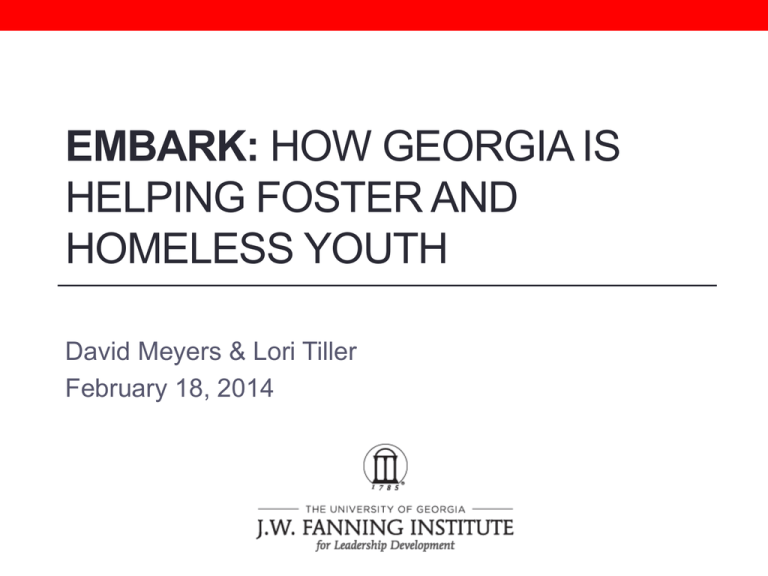
EMBARK: HOW GEORGIA IS HELPING FOSTER AND HOMELESS YOUTH David Meyers & Lori Tiller February 18, 2014 Session Objectives Part I • Why are we here? • National scan • Embark • Self-Assessment • Q&A • Participant Challenge Definition of foster youth Foster care means 24-hour substitute care for children placed away from their parents or guardians and for whom the State agency has placement and care responsibility. This includes, but is not limited to, placements in foster family homes, foster homes of relatives, group homes, emergency shelters, residential facilities, child care institutions, and preadoptive homes. Definition of Homeless/Unaccompanied youth Individuals whose nighttime residence is NOT: • Fixed: stationary, permanent, and not subject to change • Regular: used on a predictable, routine, or consistent basis • Adequate: sufficient for meeting both the physical and psychological needs typically met in the home (42 U.S.C.§11434A(2)(B)(i)) Unaccompanied Homeless Youth (UHY): • Homeless and not in the physical custody of a parent or guardian; in practical terms, this means the youth does not live with the parent or guardian. Foster Care and Education 399,546 2.8 • Number of children and youth in foster care on 9/30/2012 • Average number of living arrangements during first FC stay 249,107 • Number of foster children of school age 2x others • Likelihood of being absent from school 56% - 75% • Percent of foster youth who change school when first entering care 34% • Percent of 17-18 year olds in care who have experienced 5+ school changes 3x others • Likelihood of 17-18 year old foster youth being expelled 7th grade • Average reading level of 17-18 years olds in foster care 50% • Percent of foster youth who complete high school by 18 84% • Percent of 17-18 year old foster youth who want to go to college 20% • Percent of foster youth who graduated from high school who attend college 9% • Percent of former foster youth who attain a certificate/AA/bachelor's degree A few examples of DFCS initiatives in Georgia… • IDA accounts for youth administered through DHS • ETV federal funds administered through DFCS/ILP • EPAC Unit at DFCS created to provide comprehensive educational support (Educational Programming, Assessment and Consultation) • Recent Data Sharing agreement between DFCS and GaDOE Initiatives inspired by the Georgia College Access Challenge Grant • Creation of a network of post-secondary institutions who • • • • • communicate the specific needs of this population (Embark) Creating on campus programming (USG/TCSG) Increased opportunities for exposure to college environments such as pre-collegiate experiences (CACG) Training, coaching, and mentoring (ODB) Develop a section of GA College411 that is specifically designed for foster/homeless youth (GSFC) Bring Apply to College and FAFSA events to ILP groups and group homes (GSFC) WHAT IS HAPPENING NATIONALLY TO SUPPORT THIS WORK? Casey Family Programs - Supporting Success NAEHCY - College Access and Success • Program Development Highlights: • Designated Leader (DL)/Special Points of Contact (SPOC) • Internal and External Champions • Collaborations with Community Agencies • Data Driven Decision Making • Staff Peer Support and Professional Development • Sustainability Planning • Direct Support Highlights • Housing • Financial Aid • Academic Advising, Career Counseling and Supplemental Support National Movement to Increase Supports: Promising Practices in Other States Campus Based Programs Based on Casey Family Programs: Supporting Success • Financial Support • Academic Support • Social/Emotional Support • Designated Points of Contact on Campuses Statewide Networks of Support Promote connectivity and sharing of ideas among Technical and University campuses • Regional meetings and Statewide conferences • Web based communication and social networking • Technical assistance for program development and enhancement California Goals of Guardian Scholars Program: • Short-term outcomes include sustaining academic progress towards educational goals which includes youth obtaining college course credit for all units attempted each semester. • Long-term goals include youth obtaining and graduating with bachelor’s degree. http://www.fullerton.edu/guardianscholars/ Michigan • Statewide Network: • Fostering Success Michigan • Western Michigan University Seita Scholars Program • Reside on-campus; • Maintain full-time student status; • Take a seminar course for Seita scholars; • Maintain satisfactory academic progress; • Participate in academic monitoring; • Abide by university codes for campus living; • Attend all classes; • Attend scheduled program events; • Pay bills on time; • Meet regularly with a program advisor; • Refrain from working off campus; • Campus coaches to help navigate campus life. http://fosteringsuccessmichigan.com/ Washington • College Success Foundation • Washington College Access Network • College Bound Scholarship • Specific Initiatives for Foster Youth • Make it Happen • Passport to College Regional Summits • The Washington State Governors’ Scholarship for Foster Youth • Passport to College Promise Scholarship • Washington University • Champions Program http://www.collegesuccessfoundation.org/ http://depts.washington.edu/omadcs/champions/ Virginia • Great Expectations • Individualized tutoring • Help applying for college admission and financial aid • Career exploration and coaching • Help applying for and keeping a job • Life skills training, including managing finances • Personalized counseling • Student mentors http://greatexpectations.vccs.edu/ 15 Reach states • Texas http://www.texasreach.org/ • Ohio http://ohioreach.wikispaces.com/ • Alabama http://www.reach.ua.edu/ • North Carolina http://www.ncreach.org/ • Missouri http://www.fc2sprograms.org/mo-reach/ EMBARK UGA: Campus Based Support Program Embark UGA will increase the opportunities for UGA students who have experienced foster care or homelessness by providing supports that promote success and well-being beyond an education. Financial support has been provided through USG/CACG, Casey Family Programs and Community Foundation for Greater Atlanta. Existing Georgia Campus Programs Institutions with existing programs of support or interest in developing programs: • Kennesaw State University (Homeless Specific) • Savannah State University • Georgia Gwinnett College • Georgia State University • Southeastern Technical College (Swainsboro campus) • Georgia Tech • Others?? Embark Georgia: Statewide Network The Embark Georgia statewide network serves post-secondary professionals and institutions to ensure connectivity, share best practices, and provide information exchange among youth, community based stakeholders, and K-12 education. SELF ASSESSMENT How ready is your campus? Contact Information David Meyers Lori Tiller Public Service Faculty (706) 542-5062 - Office dmeyers@fanning.uga.edu Public Service Faculty (706) 583-5532 - Office lrl@fanning.uga.edu J.W. Fanning Institute for Leadership Development University of Georgia 1240 S. Lumpkin Street Athens, GA 30604 embark@fanning.uga.edu www.fanning.uga.edu • Sources: • Georgia College Access Toolkit (include web address) • NAEHCY Toolkit • Supporting Success Fostering Success in Education: National Factsheet on the Educational Outcomes of Children in Foster Care
